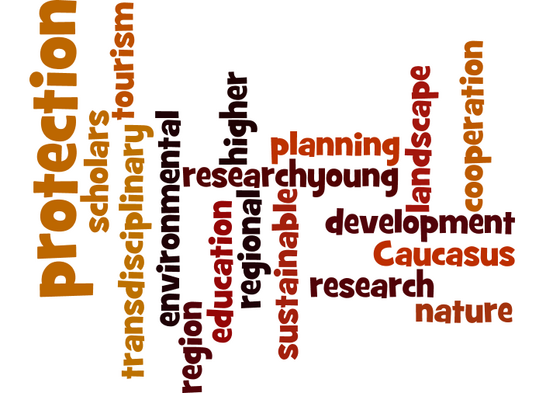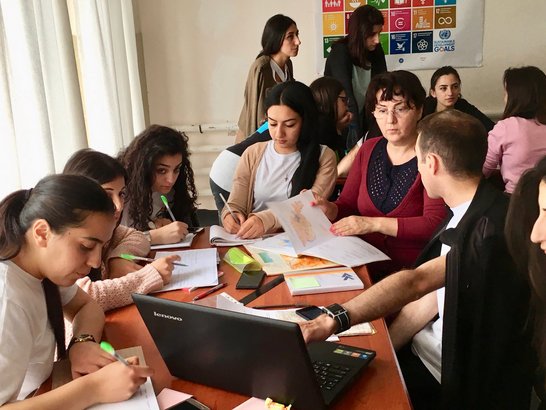
Transdisciplinarity for Sustainable Tourism Development in the Caucasus Region | CaucaSusT

Project Coordinator: Andreas Muhar
Coordinating Institution: University of Natural Resources and Life Sciences, Vienna
Partner Institutions: Ivane Javakhishvili Tbilisi State University (Joseph Salukvadze), IMC FH Krems (Christian Maurer), Armenian State Pedagogical University after Khachatur Abovyan (Ashot Khoetsyan)
Partner countries: Armenia, Georgia
Project Duration: 1st of July 2016 – 30th of November 2020
Abstract
The role of science and research in addressing challenges in the field of sustainable development, and the link of academia to policy and practice needs to be strengthened in Armenia and Georgia. Progress in this respect highly depends on innovating university practices, including by introducing transdisciplinaryapproaches to teaching and research practices. The Academic partnership will enable the project partners to address real-life problems of sustainable development - focusing on tourism development - in cooperation with the local population and other stakeholders. On a wider scale beyond the target countries Armenia and Georgia, the academic partnership will strengthen cooperation on academic activities on tourism development in the whole Caucasus region, and facilitate better coordination, coherence and integration of research outcomes into public policy in this field, via cooperating with and supporting activities of the regional Scientific Network for the Caucasus Mountain Region (SNC-mt).
The overall project goal is contribution to capacity development for the universities in transdisciplinary teaching, specifically by:
- Introducing a number of new approaches:
- Case study teaching format;
- Transdisciplinarity in teaching and interdepartmental cooperation
- Knowledge and experience exchange on promoting diversity and equal opportunities in the university policies and practice.
- Supporting young scholars as well as university-practitioner cooperation in problem solving on economic development via sustainable tourism development and transdisciplinary approach.
- Contribution of tourism content to building of the Caucasus scientific network.
List of project results
The partners carried out 2 Teacher Workshops, 1 in Armenia and 1 in Georgia, in which 23 teachers from ASPU and TSU participated, in addition to the project coordinators and Austrian colleagues. During the workshops, the main background information and elements of the transdisciplinary case study courses were discussed, and interdisciplinary methods tried out. Moreover, initial stakeholder meetings took place in both countries. Transdisciplinary approaches have been integrated at both ASPU and TSU. At ASPU teachers from five departments participated in the introduction of new courses and development and implementation of the Transdisciplinary Case Study Course, including: Sustainable Development and Ecology, Physical and Economic Geography and History, Sociology and Biology. Four new courses have been introduced, including the Case Study Course.
At TSU, three Faculties (Economics and Business, Exact and Natural Sciences, Social and Political Sciences) and three Masters programs (Tourism and Hospitality Management, Landscape Planning & Regional Geography and Human Geography) participated. Six existing study courses in these three programs have been modified, and two new courses have been introduced, including the Transdisciplinary Field Case Study Course.
6 Transdisciplinary Field Case Study Courses have been implemented in Armenia and Georgia, in two different communities in Armenia (in Meghradzor, 2018 and 2020 and in Dilijan, 2019), and three communities in Georgia (in Tsaghveri, 2018, Kazbegi, 2019, and Racha, 2020). A total of 46 students took place in the case study courses in Armenia (41 of them female), and 57 students - in Georgia (37 of them female) The case study courses involved close collaboration with the local stakeholders: a total of 59 local actors were involved, 40 from Georgia and 19 from Armenia.
A Manual for University Lecturers on Developing and Implementing a Transdisciplinary Field Case Study Course has been published based on the experience of all partners, available electronically and in a print version in English, Armenian and Georgian languages.
ASPU colleagues produced a manual of using the Case Study Approach in History, based on their experience in the project. Moreover, inputs based on the project have been integrated in 12 various manuals, national journals and books, Armenia, Austria and Georgia.
21 Scientific publications in international and national peer reviewed journals have been produced by the project partners.
2 PhD students have received APPEAR scholarships in association with the project, and have supported project implementation, collaboration between the partners, and accompanied project activities with research.
4 PhD (1 from Armenia, 3 from Georgia) students and 2 Master students (from Armenia) carried out an exchange semester at BOKU, in connection with the project, and with the help of Erasmus+ funds.
A number of Master students from ASPU and TSU had a chance to receive support from IMC Krems staff in developing papers, in order to present them at the International Student Conference in Tourism Research (ISCONTOUR), organized annually by IMC Krems in Austria. 10 Master students from ASPU and TSU (4 male, 6 female), and 4 staff participated in ISCONTOUR in 2019. 14 students from Armenia and Georgia (13 female, 1 male) sent their drafts of the papers for ISCONTOUR 2020 and received coaching on developing their papers. Papers of the 7 students (4 from Georgia and 3 from Armenia) have been accepted and published in the proceedings, despite the cancellation of the conference due to COVID-19.
16 Master Theses have been completed, based on the project (6 at ASPU, 9 at TSU and 1 at BOKU).
The project partners organized a Transdisciplinary Summer School in June-July 2019, in Kazbegi, Georgia. BOKU and TSU, the main organizers, coopered with Leuphana University Lüneburg and the Doctoral School Transitions to Sustainability (T2S) at BOKU. 36 scholars and professionals from 17 different countries, including the 6 Caucasus countries, representing different cultural and professional backgrounds, participated in the Summer School and learned to develop transdisciplinary research projects. Moreover, the CaucaSusT partners participated in the International Summer School for young researchers “Research for Development”, organized by the Institute of Geography of Russian Academy of Science under the framework of the project “Sustainable Mountain Development in the Caucasus (Sustainable Caucasus)” under the SCOPES program funded by Swiss National Science Foundation (SNSF). The Summer school took place on September 5-16 in the Abastumani Research Center in Georgia and hosted BA, MA and PhD students from six countries: Georgia, Russian Federation, Azerbaijan, Armenia, Iran and Turkey. The CaucaSusT partners made several presentations: on transdisciplinarity and sustainable tourism, and organized a World Café (a participatory workshop). Issues discussed included the needed skills for students and teachers, envisioned benefits for the students from the CaucaSusT project, recommendations for implementing the Case Study Courses and challenges for integrating transdisciplinary approaches into Caucasus universities.
In order to introduce inputs from the project on a wider regional level, the CaucaSusT partners participated in the 1st and 2nd Caucasus Mountain Forums, organized by the Scientific Network for the Caucasus Mountain region. During the First Forum, which took place on November 28 – December 1, 2016 in Tbilisi, Georgia, the CaucaSusT partners organized a participatory workshop “Research for Communities and/or Research with Communities: Transdisciplinary research and teaching in sustainable mountain development and tourism”. During the Second Caucasus Mountain Forum, which took place in Ankara, Turkey, on October 30 – November 2, 2019, the CaucaSusT staff, teachers and students presented their project-related work, and organized a workshop “The role of universities in sustainable transformations in the Caucasus region”, with panelists from all 6 Caucasus counties.
Impact and sustainability
The CaucaSusT project resulted in the important first steps taken towards participatory decision making via stronger collaboration between local community stakeholders and universities in Armenia and Georgia. We consider this an important contribution with long-lasting outcomes for participatory governance, should this cooperation continue. We consider integration of transdisciplinary approaches in Armenia and Georgia, an established cooperation between our university partners and local stakeholders, and a thorough understanding of its possibilities and challenges, reflected in our publications, to be the main contribution of our project to development on a more general and long-term level.
Concretely, via the four case study courses useful proposals have been made, in cooperation with the local stakeholders, for sustainable tourism development of the participating communities, and specific benefits for certain stakeholders have been achieved (as documented in the stakeholder benefits annexes submitted with each of our annual reports).
With support with our PhD candidate from Armenia, associated with the project, we have contributed to initiating of a discussion in Armenia about the greater role universities can play in developing policies, as well as contributing to sustainable development of communities. In fact, our joint work has provided broader insights into potential and challenged of integrating and implementing transdisciplinary approaches in the post-soviet academic systems.
In Georgia, with our PhD candidate focused on community-based tourism, we have contributed to building expertise better understanding of potentials and barriers in this respect.
Highlights from ASPU:
University: The program has enabled the university to enter into new cooperation programs with international universities, which opened considerable capacity building and institutional development opportunities, thus increasing the scope of the university or participation opportunities in co-creation and integration of knowledge on the local, national and international levels. Moreover, the continuity of education in the implementation of master's "postgraduate educational mobility" increased.
Teachers and administration: In terms of faculty administration, the capacities for cooperation have also increased, evident from the increase of contacts with international universities. Some of the lecturers have participated in foreign trips, and thus had the opportunity to gain experience, the scope of their research has increased, as well as the possibility of using new methodological tools; Students: There have been new achievements in terms of students, both in terms of professional knowledge and communication with foreign students, in terms of acquiring new interpersonal qualities.
Our community partners: The project has made a significant contribution to the communities under study in terms of being a beneficiary, in the process of developing their own community, in terms of discovering new development opportunities as a result of the introduction of international experts, in terms of implementing actions. After the end of the program, the number of people interested in the development of the community and in an active involvement in the development of the community has increased.
Other groups: The involvement of non-governmental organizations has increased, and the publicity of our research has been crucial to increasing government activism.
Highlights from TSU:
Tbilisi State University achieved outcomes in the framework of the project to promote/ensure academic sustainability, i.e. teaching and research; It should be noted, that project enhanced cooperation between different academic units, it was a new experience for the teachers. Establishing the cooperation platform intensified the opinion exchange process, which is a significant factor for knowledge creation. Furthermore, training and workshops organized in the framework of the project offered extensive opportunities to all teachers engaged in the project, in order to practice new skills and experiences. The Teacher Training and workshops contributed positively from several aspects: creating new views and ideas, helping teachers to form an educational and methodological framework, designing different scenarios, and learning key aspects of transdisciplinary research issues.
Furthermore, working jointly within the framework of the workshops and meetings with the partners was an additional opportunity to exchange knowledge and transfer our experiences in the field of tourism.
For the first time, students got involved in extensive studies in sustainable development in their classes at TSU. In the field, they practiced discussions with different stakeholders, including local decision-makers. All these have raised students’ academic knowledge as well as the capacity for professional communication outside academia. Herewith, we strongly believe that non-academic stakeholders also gained a lot from this program, especially from case-studies, and widened their vision and professional capacities.

